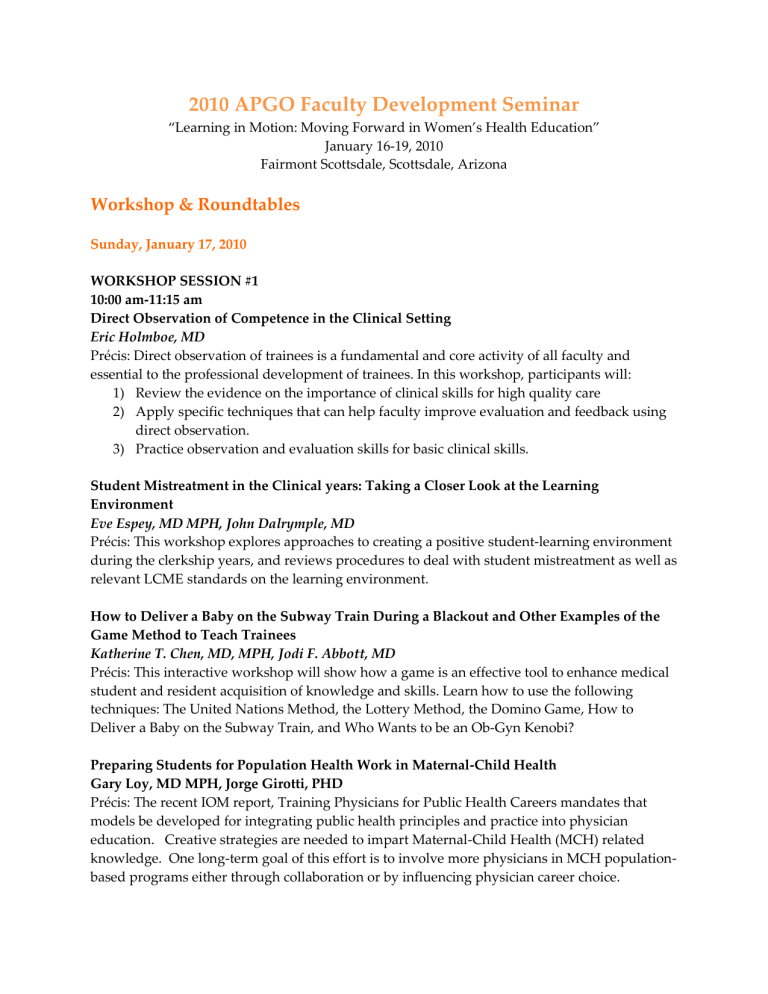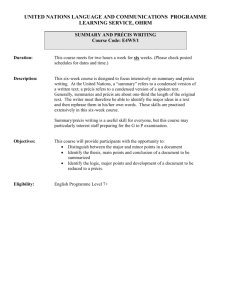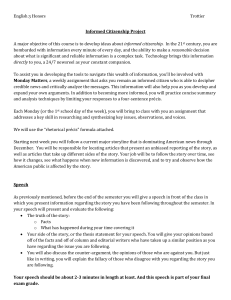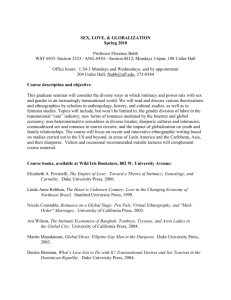2010 APGO Faculty Development Seminar “Learning in Motion

2010 APGO Faculty Development Seminar
“Learning in Motion: Moving Forward in Women’s Health Education”
January 16-19, 2010
Fairmont Scottsdale, Scottsdale, Arizona
Workshop & Roundtables
Sunday, January 17, 2010
WORKSHOP SESSION #1
10:00 am-11:15 am
Direct Observation of Competence in the Clinical Setting
Eric Holmboe, MD
Précis: Direct observation of trainees is a fundamental and core activity of all faculty and essential to the professional development of trainees. In this workshop, participants will:
1) Review the evidence on the importance of clinical skills for high quality care
2) Apply specific techniques that can help faculty improve evaluation and feedback using direct observation.
3) Practice observation and evaluation skills for basic clinical skills.
Student Mistreatment in the Clinical years: Taking a Closer Look at the Learning
Environment
Eve Espey, MD MPH, John Dalrymple, MD
Précis: This workshop explores approaches to creating a positive student-learning environment during the clerkship years, and reviews procedures to deal with student mistreatment as well as relevant LCME standards on the learning environment.
How to Deliver a Baby on the Subway Train During a Blackout and Other Examples of the
Game Method to Teach Trainees
Katherine T. Chen, MD, MPH, Jodi F. Abbott, MD
Précis: This interactive workshop will show how a game is an effective tool to enhance medical student and resident acquisition of knowledge and skills. Learn how to use the following techniques: The United Nations Method, the Lottery Method, the Domino Game, How to
Deliver a Baby on the Subway Train, and Who Wants to be an Ob-Gyn Kenobi?
Preparing Students for Population Health Work in Maternal-Child Health
Gary Loy, MD MPH, Jorge Girotti, PHD
Précis: The recent IOM report, Training Physicians for Public Health Careers mandates that models be developed for integrating public health principles and practice into physician education. Creative strategies are needed to impart Maternal-Child Health (MCH) related knowledge. One long-term goal of this effort is to involve more physicians in MCH populationbased programs either through collaboration or by influencing physician career choice.
Optimizing the Mid-Clerkship Review Session
Lorraine Dugoff, MD, Petra Casey, MD
Précis: The mid-clerkship review is a critical component of an obstetrics and gynecology clerkship wherein the students receive formal review of experience to date. The goals of this workshop are to review components of a typical mid-clerkship review, discuss challenges to carrying out an effective mid-clerkship review, and provide participants with an opportunity to develop and/or optimize their mid-clerkship review for use at their institutions.
More Alike than Different
Abigail Wolf, MD, Kelli Daniels, MD, Ann Honebrink, MD
Précis: This session will review successes and challenges of shared clinical sites for Obstetrics and Gynecology clerkship. We will also review our experience in creating a working group for local clinical clerkships.
WORKSHOP SESSION #2
11:30 am-12:45 pm
Building a Professional Practice Curriculum: the Content, Methods and Tools
Daniel G. McMurtrie, MD
Précis: Using an interactive process, we will discuss the important topics that should be contained in a professional practice curriculum. Some effective teaching tools will be presented and shared to assist student educators as they incorporate these topics into the clinical clerkship.
Why, What, When: Developing and Integrating a Basic Clinical Skills Curriculum into your
Clerkship
Maya M. Hammoud, MD, John Dalrymple, MD
Précis: This workshop will help clerkship directors and faculty develop and implement a basic clinical and surgical skills curriculum for medical students. Participants will be provided with a variety of practical information and have the opportunity to develop their own ideal curriculum that fits their budget.
How to Use the Newly Redesigned and Streamlined APGO Medical Student Educational
Objectives to Redesign Your Clerkship's Objectives, Education Program, and Evaluation
Process
Edward (Ted) Peskin, MD, Lorraine Dugoff, MD
Précis: APGO has redesigned and streamlined the Medical Student Educational Objectives for
2010. Participants will work with this document in small groups in order to become familiar with how to use it to redesign or modify the Ob-Gyn Clerkship at their home institution.
Biopsy Positive: Risk Identification of Unprofessional Behavior in Medical Education
Kelly A. Best, MD, Brent E. Seibel, MD, Guy I. Benrubi, MD
Précis: Using small group simulated tasks, workshop participants will learn how to develop strategies for early detection and intervention of unprofessional behaviors, gain insight into their own view of professionalism, and acquire tools in dealing with "biopsy positive" learners at their institutions.
Teaching and Learning Professionalism and Emotional Intelligence through Team-based
Learning
Joseph M. Kaczmarczyk, DO, MPH, Nadine Katz, MD
Précis: This interactive workshop will explore the interrelationship between professionalism and emotional intelligence and include a team-based learning exercise for teaching and learning professionalism that may be applied toward satisfying, in part, LCME MS-31-A.
Educational Research 102: Selecting the Best Study Design for Your Question
Francis Nuthalapaty, MD
Précis: This workshop is designed to provide participants an overview of how they can incorporate research methods into the design and evaluation of their curricular interventions.
The session will progress from writing the research question to selecting the most appropriate study design.
Lunchtime Learning Session:
1:00 pm – 2:15 pm
Salon D/E
Bruce Meyer, MD, MBA
Designing Your Future: Becoming Your Own Career Advocate
Précis: Participants will learn about advocating for and achieving personal and professional development planning. They will participate in a ‘histories of the future’ interactive exercise to imagine and actualize the professional environment of their future. Participants will discuss a structured approach to finding resources for personal and peer development; creating clear objectives; developing a specific ‘business’ plan and measuring success in career and professional development. Topics to be addressed will include new skill acquisition, improved job performance and evaluating new career opportunities. Enhanced professional satisfaction will be discussed through techniques and approaches to improving the work or educational environment and Self-mastery.
Monday, January 18, 2010
WORKSHOP SESSION #3
10:45 am-Noon
Dysfunctional Behavior and Excessive Individualism in Medicine: The Impact of Rewarding
IQ over EQ
Patrice Weiss, MD, Amanda Murchison, MD
Précis: Educators must recognize that the structure of medical education may contribute to the development of extreme individualism in future physicians by rewarding professional achievements while at times ignoring personal psycho-social dysfunction. Participants will be challenged to accept this premise as true through personal lifestyle and historical data as it relates to medical students, residents and attendings. Trends, clues and patterns of dysfunctional behavior will be highlighted to assist educators in recognizing these behaviors and methods to effectively utilize resources to address the dysfunction and excessive individualism will be provided.
PRECEDE—A Interdisciplinary Clerkship Level Clinical Skills Curriculum
Nancy Hueppchen, MD, MSc, Betty Chou, MD, Shari Lawson, MD
Précis: This interactive workshop will introduce the PRECEDE interdisciplinary clinical skills curriculum which teaches collaboration in learning and patient care. For this transitional curriculum, participants will develop an interdisciplinary learning exercise that is ready for implementation at their home institutions.
Teaching Teamwork in Labor & Delivery Scenarios
Kimberly Harney, MD, Cynthia DeTata, MD
Précis: Clerkship students were involved in interactive simulations of simple, but acute L&D problems. They learned teamwork and appreciated the intern's point of view regarding teaching students. Workshop participants will view video of the scenarios and practice their debriefing technique.
Educational Outcomes: Measurable Objectives for the Classroom and Clerkship
Abigail Wolf, MD
Précis: Participants will learn to design measurable educational objectives, match the most appropriate teaching techniques to the learning objectives and describe appropriate methods of assessment and evaluation.
Communication to Modify Behavior: The Feedback-Evaluation Continuum
James Neutens, MD, William Metheny, PhD
Précis: This hands-on workshop explores feedback and evaluation as communication techniques to promote professional behavior and prevent or ameliorate negative behavior.
Residents as Teachers: What are We Doing to Help Them Teach Our Students?
Amie J. Cullimore, Bed, MD, MSc Cara Donnery, MD, John L. Dalrymple, MD
Précis: Residents play a significant role in educating undergraduate medical students. This interactive workshop will examine factors that encourage and discourage residents to teach, as well as discuss the key components of a residents-as-teachers program.
WORKSHOP SESSION #4
12:15 pm-1:30 pm
Learning Ownership: Using Meta-Cognition to Help Prepare Students for Lifelong Learning
Nagaraj Gabbur, MD, Robert E. Berry, Jr., MD
Précis: Meta-cognition is a skill used in everyday learning. Knowing how to use this skill can differentiate a novice learner from a successful expert lifelong learner. Workshop participants will learn about this concept and will formulate strategies to help students enhance this skill.
Advancing Your Career by Turning Educational Activities into Scholarship and Promotion
Maya M. Hammoud, MD, Nadine T. Katz, MD
Précis: This workshop will help clinicians and educators develop strategies to define and achieve their personal career goals in a complex and busy environment. Workshop participants will discuss various forms of educational activities and learn how to turn them into recognizable scholarly work leading to career advancement and promotion.
Developing and Implementing an Ob-Gyn OSCE
Petra Casey, MD
Précis: The OSCE will be reviewed in the context of its value as a formative and summative assessment tool. Requirements for and challenges in the implementation of an OSCE program will follow in an interactive "brainstorming" session.
The Economy's "Elephant in the Room"
Martin L. Pernoll, MD, Martin W. Pernoll
Précis: Educators' understanding of the factors influencing the economy is crucial to their teaching of life skills to students, role(s) as administrators, and being effective competitors for dwindling resources.
Tools for Designing a 4th Year Medical Student Obstetrics and Gynecology Elective
Michelle L. Matthews, MD, Susan Bliss, MD, Joseph “Mac” Ernest, MD
Précis: Attendees will be provided with the resources necessary to develop a curriculum for a
4th year medical student elective in any sub-specialty or generalists area of ob-gyn. Available online resources will be demonstrated. Additional templates will be provided to develop a comprehensive curriculum that incorporates the necessary learning objectives, teaching techniques and evaluation methods for 4th year medical students in preparation for transition to residency and life- long learning.
The Ultimate Triathlon: Succeeding as a Partner, Parent, and Physician
Nikki Zite, MD, Alice Chuang, MD, Danielle Egner, MD
Précis: This seminar will examine resources available to assist with work-life balance, including interactive online tools. Participants will discuss and design programs that could exist at the institutional level to support physicians and trainees with work-life balance.
Tuesday, January 13, 2010
ROUND TABLE DISCUSSIONS
Round Table #1
Clerkship to Residency and Beyond - Facilitating Relationships and Mentoring in the
Transition from Student to Obstetrician / Gynecologist
John G. Pierce, Jr., MD
Précis: The transition from third year clerkship to resident physician tends to be a large leap, rather than a process of growth with direct mentorship. Three types of longitudinal continuity clinics for senior medical students will be presented for implementation in a university or community setting. One-on-one specialty clinics, longitudinal student obstetric clinics, and
Centering Pregnancy are described as the "best" by graduating medical students.
Round Table #2
A Novel Approach to Clerkship Scheduling
Julie Stein Perry M.D.
Précis: With an anticipated need for more physicians, many medical schools have begun to increase class size. At the same time, competition for clinical sites is increasing from both offshore medical schools and the creation of new American medical schools. In order to maintain the quality of medical education and continued adherence to LCME requirements, novel approaches to clinical scheduling are considered. This roundtable will outline a 3-shift schedule for medical student experience on labor and delivery. Emphasis is placed on teamwork, student-to-student sign-out, and preservation of clinical experience.
Round Table #3
Students Teaching Students: Covering APGO Educational Objectives During the Ob-Gyn
Clerkship
Star Hampton, MD
Précis: Participants will be familiarized with the current APGO Educational Objectives, and common ways that such objectives are covered. An innovative “students teaching students” program of student case presentations based on these objectives will be described and discussed. Student evaluation methods will be reviewed, and parameters for success determined.
Round Table #4
Mentoring Ob-Gyn Student Research Projects
Lorrainne Dugoff, MD
Précis: This roundtable will discuss how to optimize the medical student research experience.
They will discuss research ideas, IRB issues, a timetable for the steps of a student research project and potential pitfalls. Participants will be encouraged to share their experience with medical student research at their institutions.
Round Table #5
Professionalism, Ethics, and Power Dynamics in an Ob-Gyn Clerkship
Jessica Illuzzi, MD
Précis: In this session, they will discuss a weekly forum designed to address issues of professionalism, ethics and power dynamics within the OB-GYN clerkship. Individual students describe challenging or disturbing experiences in the clinical setting, and the group shares insights about these situations including potential solutions for dealing with them.
Round Table #6
RIME and Reason: Teaching Residents, Evaluating Medical Students
Marygrace Elson, MD
Précis: The session incorporates obtaining individualized midblock feedback for medical students in the clerkship, thus addressing LCME ED 24, 30 and 31. This is an engaging curriculum used to develop resident teaching that is presented during the residents’ protected educational time.
Round Table #7
Competent Communication: Beyond the FIND IT-FIX IT Model of Medical Education
Patricia M. Weiss, MD
Précis: This roundtable will highlight key probing "open-ended" questions that can be easily introduced into patient encounters by all providers (medical student to attending) to elicit more thorough answers. Participants will learn techniques to guide the patient interview while still allowing the patient to tell her story. Emphasis on the impact of improved communication and improved patient satisfaction will also be highlighted.
Round Table #8
A Community-based Ob-Gyn Program's Journey to Increased Academic and Research
Output
Dean Coonrod, MD
Précis: The development of improved academic/research output in a community-based Ob-Gyn program will be discussed, as well as the implications for resident and student education.
Round Table #9
Novel Ideas For Reinvigorating the Clerkship Experience
Valerie Lewis-Morris, MD
Précis: Participants will discuss and identify new ways to reinvigorate the clerkship experience.
Ideas will include incentivizing resident teaching and increasing student interactions with senior faculty.
Round Table #10
Longitudinal Approaches to Integrating Biomedical Ethics and Professionalism into the Ob-
Gyn Clerkship
Kathryn Witzeman, MD
Précis: Medical ethics and professionalism are important components of longitudinal medical training. This round table discussion will examine opportunities for expanding the ethical curricula introduced during the preclinical years and applying it to core clinical content and ethical dilemmas that present during the Women’s Healthcare Clerkship.
Round Table #11
Teaching Lifelong Learning: From the Silo to Integration
Maria Manriquez, MD
Précis: A basis for understanding integration vertical, horizontal and longitudinal, this workshop will review various examples of integrated curricula. We will focus on our experiences of integration and share our novel block that integrates Ob-Gyn with General
Surgery.
Round Table #12
Teaching Professionalism to Medical Students and Residents through Values Clarification about Family Planning
Jodi Steinaeur, MD
Précis: The seminar's goal is to train educators in facilitating a values clarification workshop that allows for open discussion of the challenges we face and offers strategies for addressing our reactions when we are uncomfortable about our patient's beliefs, behaviors or choices.
Round Table #13
Hitting a Professionalism Roadblock? Drive Women’s Health Education Forward with
Emotional IQ
Dawn Tasillo, MD
Précis: Emotional Intelligence may be measured and compared to other common inventories of personality and motivation. Learn how this may be used as an aid in the evaluation of the professionalism and interpersonal communication core competencies.
Round Table #14
The Great Debates
Isabel C. Green, MD
Précis: Debate is a tool that can prepare students for lifelong learning while emphasizing evidenced based medicine. Participants will learn a structured debate format, brainstorm clinical questions that are appropriate for this tool, and leave with a debate curriculum for their institution.
Round Table #15
Generational Differences in Identifying Highly Professional Behaviors
Dana Redick, MD
Précis: Professionalism may have a different meaning across generations. The workshop will work to identify the differences, to understand why they might occur, and to enhance communication across generations in the workplace and classroom.
Round Table #16
Orienting Students to the Ob-Gyn Clerkship
Lorraine Dugoff, MD
Précis: An organized and comprehensive orientation to the Ob-Gyn clerkship helps medical students have a positive first impression and a smoother transition to the clerkship. The goals of this workshop are to review typical content included in the orientation session, discuss potential challenges associated with developing a comprehensive orientation, and provide participants with ideas and tools that they can implement at their institutions.
Round Table #17
Professional Behavior: Conflict in the Environment and Cultural Competency
Gary Loy, MD, MPH
Précis: Unprofessional behavior and negative influences on the learning environment may occur if inter-professional or patient-physician cultural conflict arises. Cultural competency can be improved and cultural conflict can be reduced. Various strategies designed to reduce interprofessional and patient/physician cultural conflict will be proposed.
Round Table #18
Working with a Net --Does Decreased Work Hours and Increased Supervision Affect the
Transition to Independent Practice?
Robert E. Berry, Jr., MD
Précis: Leadership education may be the ideal approach to teaching residents the attitudes that they need to transition into successful independent practitioners.
Round Table #19
Banking on a Free Clinic:A Good Return on Clinical Transitions for Your Learners
Scott Graziano, MD
Précis: We will describe a unique experience where preclinical students transition into clinical environments, utilizing a women's health setting and background.
Round Table #20
Building Transition Courses: How Do We Ensure Medical Student Success in the Clinical
Setting?
Alice Chuang, MD
Précis: Participants will compare and critique real-life transition courses. They will create a prioritized needs assessment and develop a plan for stepwise implementation of a transition course for preclinical students to prepare them for clinical work.
Round Table #21
Desirable Non-cognitive Characteristics of Medical School Applicants: What are They and
How to Measure Them?
Joel Maurer, MD
Précis: This workshop will allow attendees to determine desirable non-cognitive characteristics of medical school applicants, and methods of evaluating these characteristics work best for creating an evaluative template to offer to their respective admissions committees.
Round Table #22
Putting Emotional Intelligence into Practice: Do You Know How You Engage in Conflict,
Communicate and Influence Others?
Dotun Ogunyemi, MD
Précis: This is an interactive workshop taking emotional intelligence from theory to practice; designed to allow participants to develop an awareness of theirs and others’ conflict styles and be able to practice in a group to self-regulate and manage relationships.
WORKSHOP SESSION #5
9:30am – 10:45am
Applying the Multiple-Mini-Interview to Your School
Kelly Dore, PhD, Amie Cullimore, MD
Précis: This session is designed for all participants interested in evaluating competencies beyond simply cognitive knowledge at the postgraduate/undergraduate level. Upon completion of this session, participants will be able to obtain knowledge of the MMI including exit surveys, overall and other forms of reliability, predictive validity for performance in medical school, clinical clerkship and national licensing examinations and its application to postgraduate selection and training. They will attain familiarity with paired comparison methodology to determine program-specific values, to facilitate use of MMI templates for station writing, and use. They will practice writing MMI stations and learn how to include the ACGME competencies and participate in a shortened MMI.
Helping Students Navigate the Residency Selection Process
Francis Nuthalapaty, MD, Nancy Hueppchen, MD
Précis: This workshop is designed to provide participants an overview of how today's students perceive the optimal residency training environment, and the key elements that need to be incorporated into a structured advising program to achieve success in the match.
Using Emotional Intelligence Assessment to Optimize Educational Programs in Obstetrics and Gynecology
Charles Kilpatrick, MD, Lubna Chohan, MD, Francis Orejuela, MD
Précis: Participants will acquire the knowledge to evaluate emotional intelligence. Hands on experience with administering and scoring validated tools for emotional intelligence assessment will be provided.
Evidenced-based Debates on Controversial Topics in Ob-Gyn
Jessica Illuzzi, MD, Beth Rackow, MD
Précis: This forum provides an opportunity to guide students in the practice of self-directed learning while exploring the evidence on relevant Ob-gyn topics encountered on the clerkship.
These skills can be applied to lifelong learning throughout one’s medical career.
The Facebook Revolution Hits Medical Education: Beginner and Intermediate Online
Networking
Alice Chuang, MD, Nikki Zite, MD, MPH
Précis: Novice and intermediate users will discuss the appropriate use of Facebook, an online networking site, and then collaborate to draft guidelines for the use of Facebook in academic medical centers. Tips for general use and improved security will be showcased.
Decisions, Decisions: Accelerating Forward Movement of the Learner by Successful Trainee
Transitioning
Robert E. Berry, Jr., MD, Anne Garrison, MD
Précis: By reviewing the literature on specialty choice selection and the UMass experience, participants will learn the critical elements in successful transition support and develop a blueprint for instituting a successful program in their institution.








